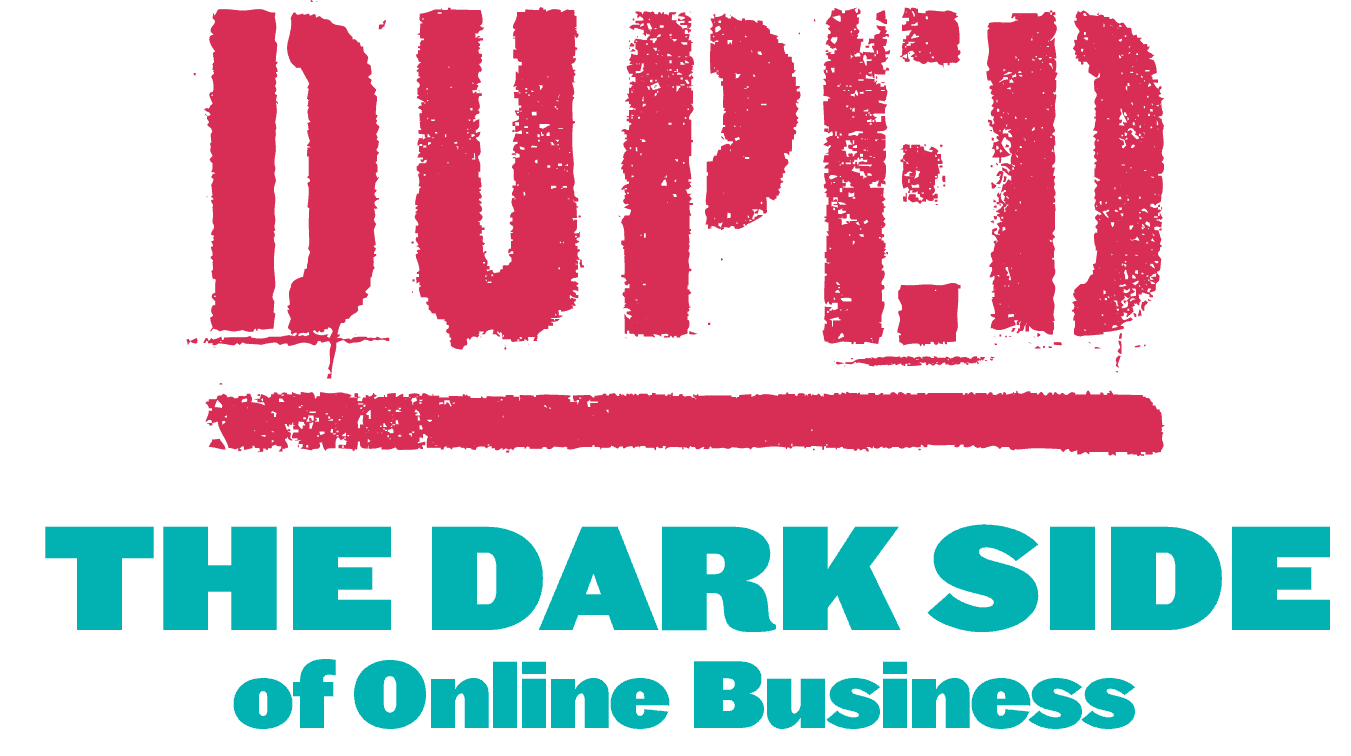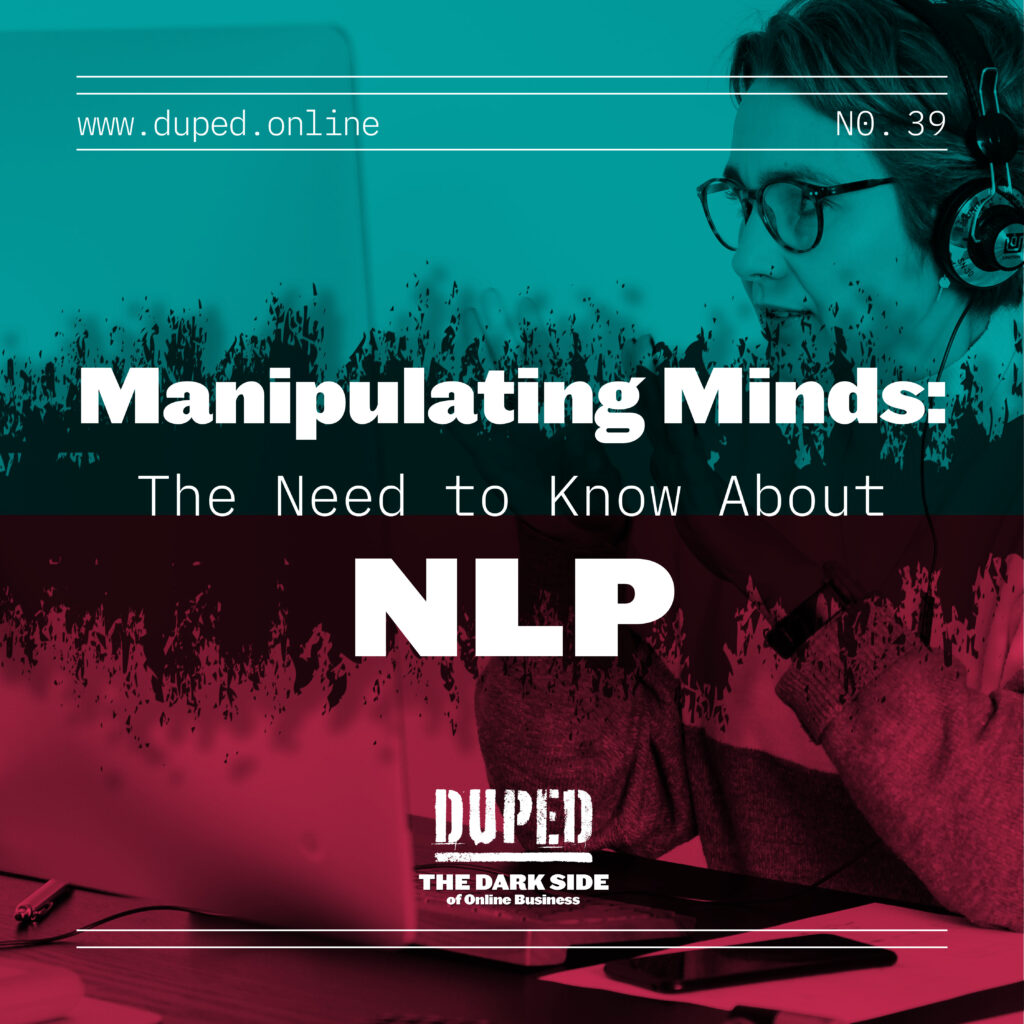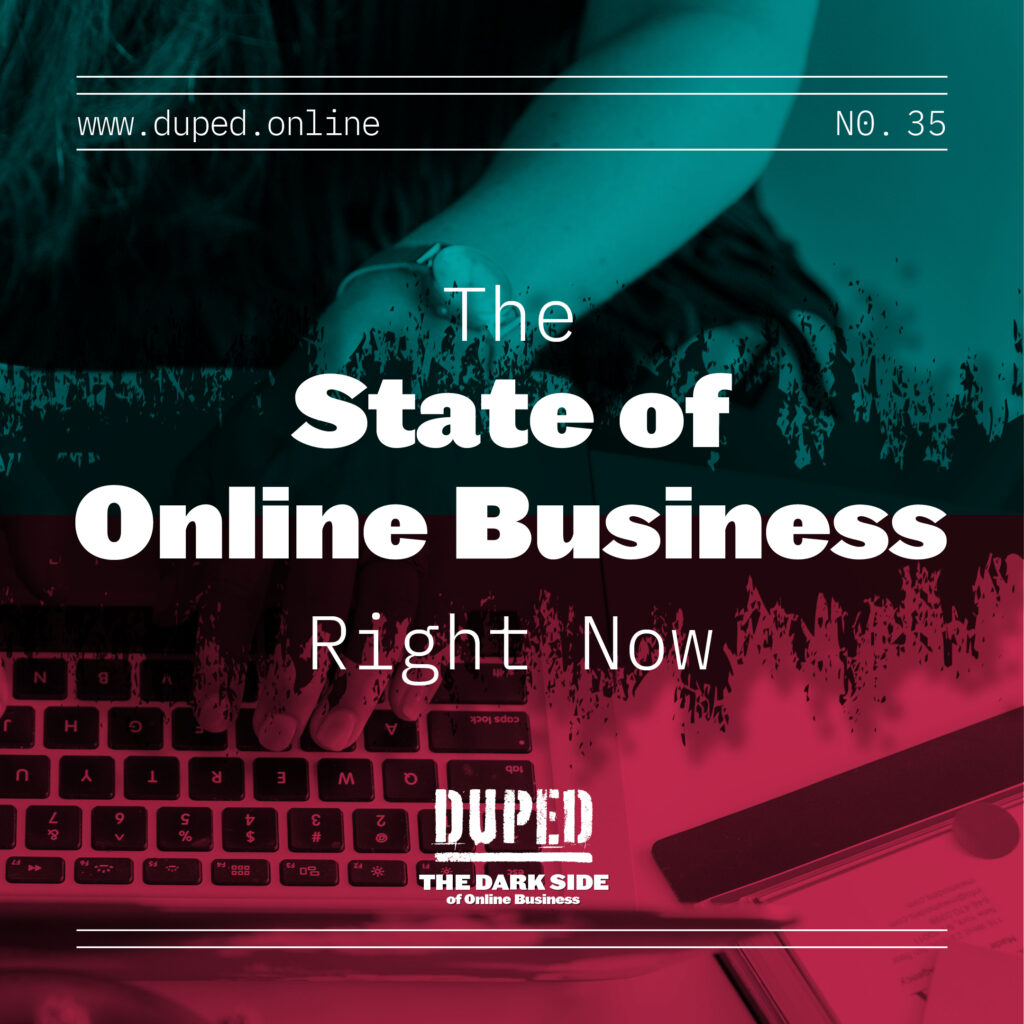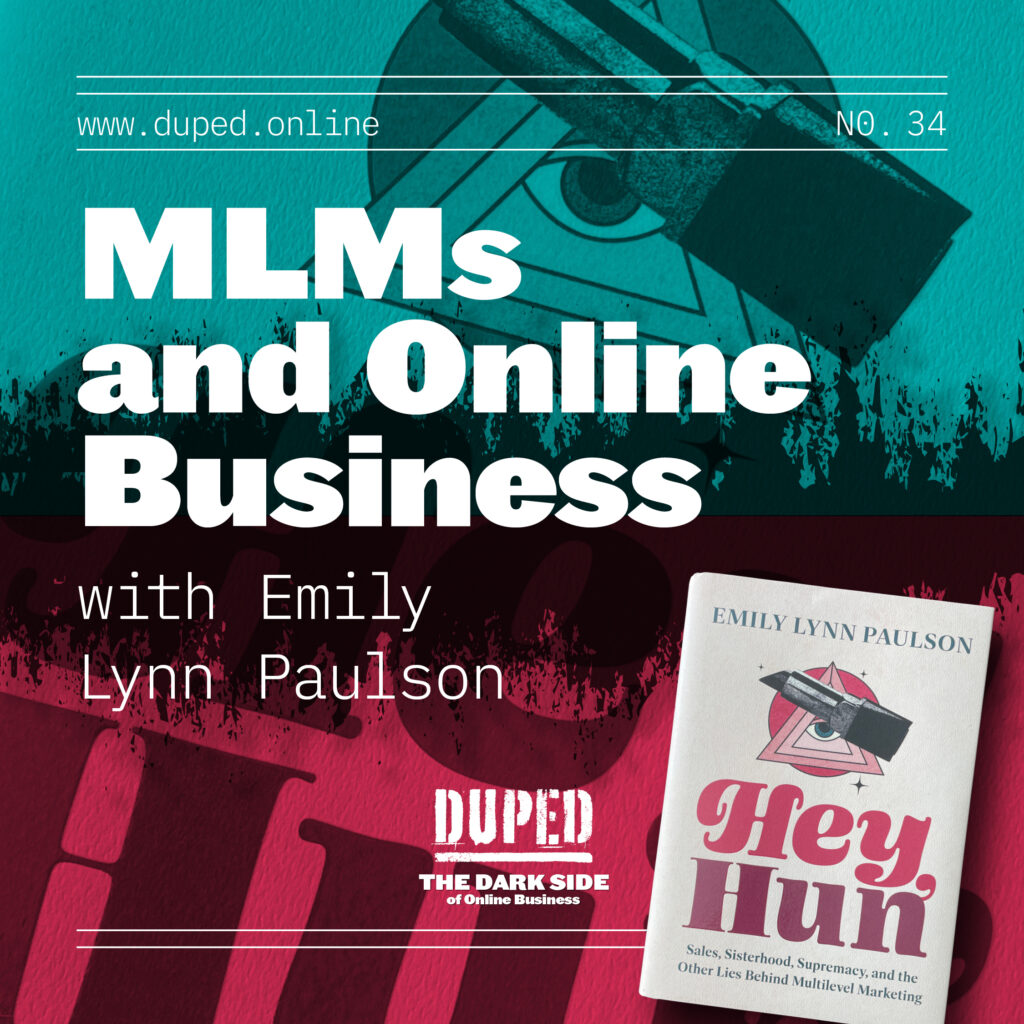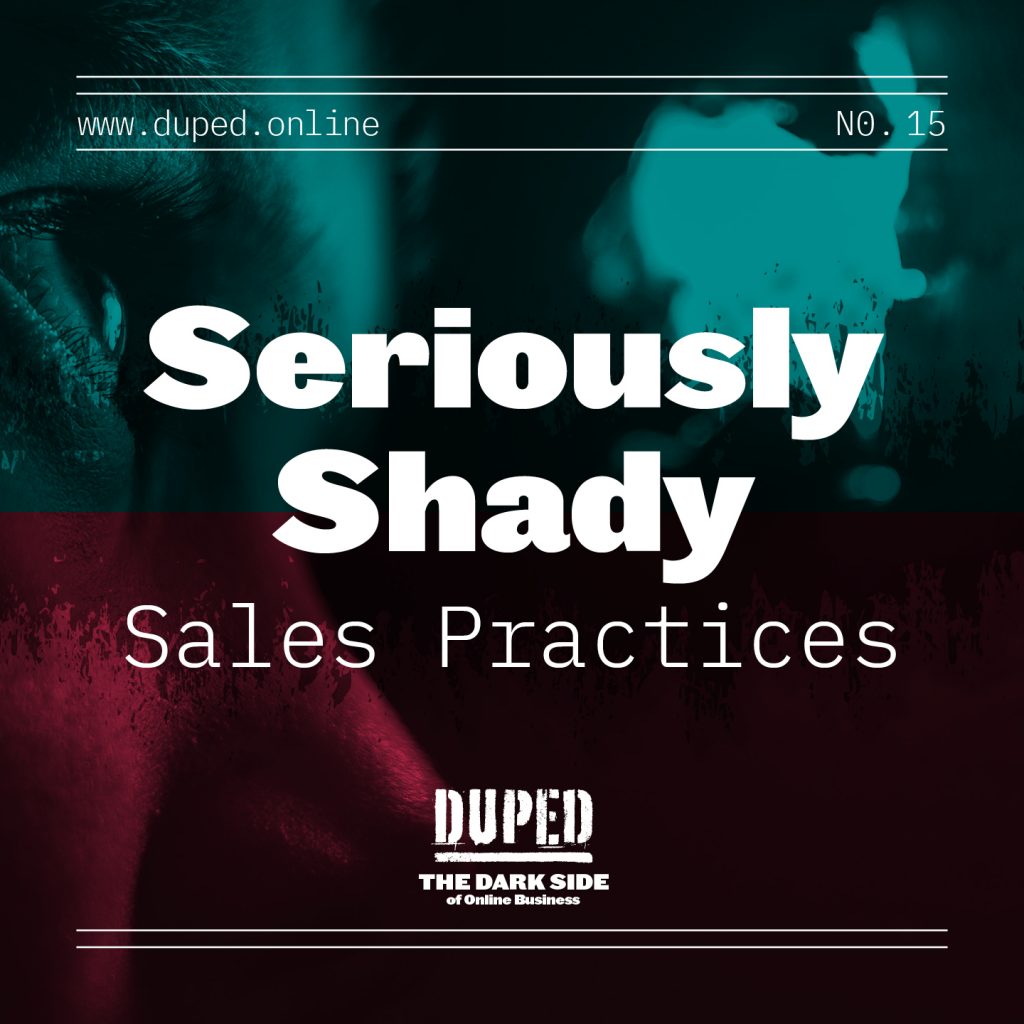
Seriously Shady Sales Practices
We’ve all had a sales experience where we were left feeling like nothing but a number or like we’ve been duped. You’re not alone in that, as there are so many shady sales practices that are all too common in online business.
In this episode of Duped, we’re doing a deep dive into some of the sales practices you should watch for as a consumer and ones you should steer clear of as a business owner.

Since we launched Duped earlier this year, we’ve covered a lot of ground when diving into the ins and outs of shady shit in online business. While we’ve touched on different sales practices, we wanted to go deeper on some of the ones that are most prevalent today in online business.
Yes, we’re talking about seriously shady sales practices with many of our not-so favorites from social selling to word salad sales pages. Our goal with this episode isn’t to just bitch about what we see wrong, but to equip you with tools to navigate when these are being used and so you know them when you see them.
When it comes to sales practices we think are super shady, we can’t even pick just one. In preparing for this episode, we spent hours going through our catalog of FB ads and sales pages. It was one part riveting as seeing the same thing over and over showed where the patterns show up. But the other part was pretty revolting.
When you see that pattern over and over and over again like we did doing the review of these practices in the wild, it’s downright sickening.
In this episode, we’re going to focus on the sales practices and processes that we see right now that are seriously shady from our point of view. It’s worth a reminder that this is not about one individual person using these, but rather an overall pattern. We’re here to critique the practices, not the characters of people using them.
In the next episode, we’re going to get into the sales psychology part of this in more detail as it’s a big reason why these practices are used the way they are.
Word Salad Sales Pages
The word salad struggle is very real in online business. We see it all the time, and we’re relatively smart people and we literally don’t know what they’re talking about. Sometimes it shows up as a far too clever turn of phrase, and other times, it’s downright nonsense.
When you’re reading a sales page, if you have to stop and try to figure out what someone really means, that’s a major problem. It’s also a massive red flag, as it’s also a tactic that’s used to deliberately confuse us. It positions the celebrity entrepreneur apart from us and as being on a different level.
When Michelle was doing her quick and dirty analysis for this episode, it was clear to her that this word salad style of writing is a sales tactic. She saw it over and over again from people that she knows to hire talented and experienced copywriters. It goes far beyond a shared language it’s designed to screw with our heads.
Sales page word salad also goes beyond thought terminating cliches. It’s less about being like “oh I’ve seen this play bigger message many times before”, and more about creating confusion so we feel like we need this person’s guidance as they’re so smart, advanced, or talented.
Hiding Prices
We don’t think this next one will surprise anyone as we’ve ranted about it before here on the podcast and a million other places.
A really common sales practice that is seriously shady in our books is hiding prices from your customers. Service providers who do custom, done-for-you work, we’re not talking to you.
We’re talking to anyone who has an offer whether that be a service, coaching, program, or course with a fixed price. Why are you making it hard for your potential customers to find the price?
Make no mistake, hiding the price is a tactic, and it’s designed to get you to make a micro commitment. It’s about having you invest your time and energy as you’re more likely to follow through thanks to sunk cost fallacy.
Sure, maybe you’ll make the sale. But the reality is that many, many more people will not go any further. It’s a signal you’re playing games and that you don’t value people’s time. Asking people to sign up for a call, or watch a webinar is a waste of time if it’s not in their budget.
For us, this is a hard pass every single time. Asking us to invest our time into a sales conversation or a webinar without the context of the price is a massive red flag. We don’t care who tells you to do this, it’s shady and unnecessary.
Sales Calls
Next up, let’s talk about the shady and sketchy shit that goes on during sales calls in this industry.
When Maggie did her Online Business Investment Survey late last year, one of the big things was how many people had made an investment in a high-pressure situation. 68.3% said they’d made an investment due to high-pressure sales tactics and FOMO.
The other part we want to flag is a more recent trend, which is how people don’t want to do sales calls. Is this shady per se, that could go either way, but for us, it’s something that raises a lot of questions about what’s really going on.
As someone who does sales calls for two of her masterminds, those calls are just as much for Maggie as the person who’s interested. For anyone who wants a sales call, they can have one, no questions asked. In other cases, we had our back/forth on DM or Voxer as that was their preference.
But for Maggie to invest in anything over a certain amount, she’s going to at least have the option to have a sales call.
What we wonder, and this may be unpopular, but why is there so much hate for sales calls? Our hunch? We don’t think these people are doing them in a way that’s actually effective.
Social Selling
You may be wondering if there are no sales calls, how are sales happening? Welcome to the world of social selling.
According to Hootsuite, social selling is “the practice of using a brand’s social media channels to connect with prospects, develop a connection with them, and engage potential leads.”
In the online business world, social selling is alive and well, and on the surface, there’s absolutely nothing wrong with it. I mean, if we’re on social media as our brand or businesses, we’re engaged in social selling.
But of course, there’s some shadiness at play because there’s always something in online business.
We think it’s worth noting that there’s nothing wrong with cold pitching per se (especially as Maggie has done it herself via LinkedIn) but this spray and pray method is a disaster. We’ve yet to get a cold pitch in my Instagram DMs that was thoughtful or well-researched. It’s always cut and paste with zero understanding of what we may need.
This then brings us to the other part of social selling that we really need to focus on — who is doing the selling.
Many businesses are using social selling to get people into their courses and programs. That means they have salespeople on their team who are focused on using the DMs as a way to engage prospective clients.
The role of the social seller has become a staple on the teams of high six-figure and seven-figure businesses, and this is where things can get a little shady.
Over the last year, we’ve been paying attention to this role of the social seller as we wanted to understand how it functions within these teams and what the expectations are. That means we’ve read many, many job descriptions for these roles, as it provides an idea of what’s really going on.
The requirements of these roles vary, as in some cases people need to find leads on social media by looking at who’s engaged with content, and in other cases, they need to take warm leads and convert them.
Either way, the common thread of these roles is that they have one goal, which is to enroll you. That means, there’s a heavy focus on overcoming mindset issues on getting people to say yes in typical online business fashion.
Yes, sales professionals need to sell, but the bigger part of this is how these individuals are compensated. It’s totally normal for salespeople to receive commission and for them to have sales targets.
But where things take a turn for us is that these individuals are relying on their commission to make up for the fact they’re not making a living wage.
In one case, we saw a role for a social sales rep that was $12k a year plus commission, for a full-time role in a major metro in the US. To do the math on that, the base compensation, assuming a 35 hour work week, and working 48 weeks a year, that’s $7.14/hour.
That’s less than minimum wage in most states, for a role that requires working nights and weekends to stay on top of the DMs.
As consumers this gives us pause, as there’s too much for the social sales rep to gain by selling me into something, even if we’re not a great fit. And honestly, we don’t blame them as the conditions they’re working under are crappy.
Beware Shady Sales Practices
As we wrap up, we don’t want this to be all doom and gloom. There are many, many people out there selling in a way that’s legit and in true service of you as a buyer. The last thing we want you to decide after this is that “sales are bad” and back away slowly, as sales are crucial to your business.
Here’s what to watch for and what to think critically about:
- Question Sales Advice: As a business owner, question what you’re being taught about sales. Just because someone is making sales using a shady tactic it doesn’t mean you need to do it too.
- Beware the Word Salad: As a business owner, ask yourself if you’re being clear in your copy. And as a consumer, watch for the use of the word salad as a way to trick you into thinking someone is smart or has all the answers.
- Proceed with Caution with Pricing: If there’s no pricing available to you, that should give you pause. Ask why there’s no price and make an informed decision before proceeding. As a business owner, if you don’t currently make the price available and it has a fixed price, consider what message that’s sending to potential clients.
- Sales Calls: Don’t fall into the trap of thinking you don’t need to do sales calls. Learn how to do them in a way that works for you and doesn’t waste your time. And if you’re buying something and there are no sales calls, ask WHY there’s no call. If you need a 1:1 connection and can’t get on a call if you want one, that’s a sign.
- Social Selling: Don’t engage in spray and pray tactics, and for any potential purchases watch for red flags when engaged with social sale reps. Remember, their job is to sell you into the program and overcome your “mindset” issues from budgets to limiting beliefs.
Links for this episode
Join the

Patreon

for only $7/month and get a
monthly bonus episode,
behind-the-scenes content
and more.
